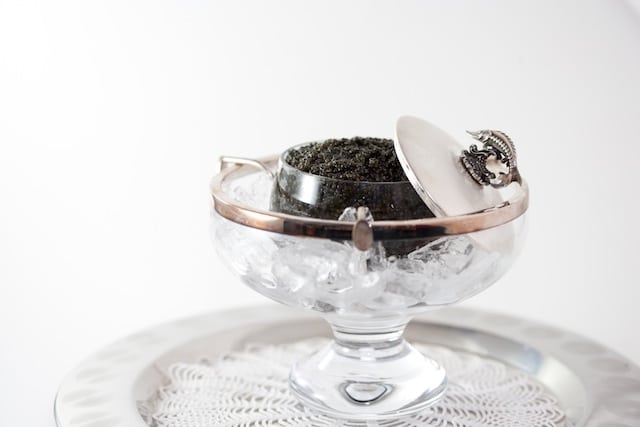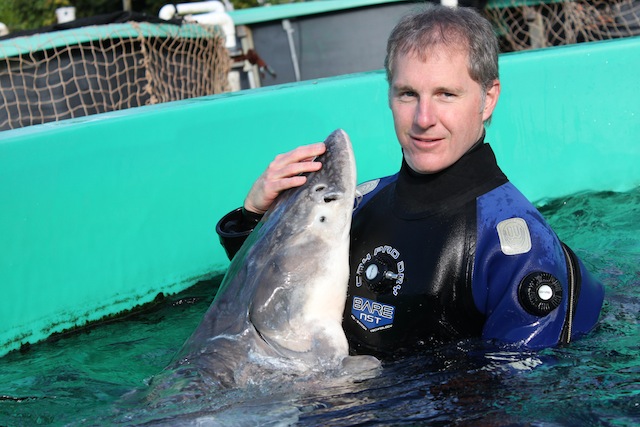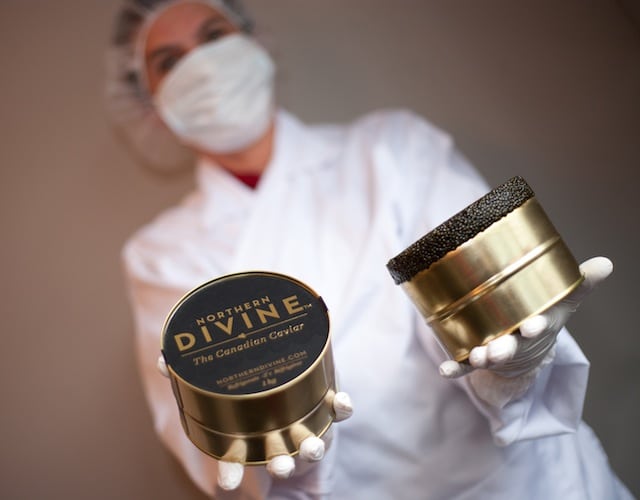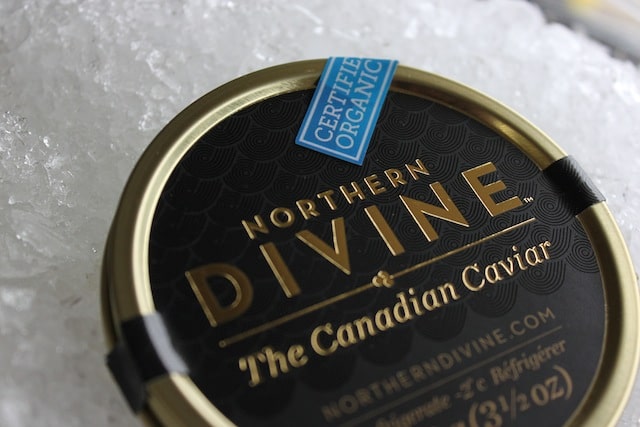
For all those who haven’t heard, caviar is okay to eat again. Actually, it’s more than okay, it’s sustainable and healthy.
While the Capsian and Black Seas once supplied all the world’s caviar, overfishing led to the downfall of fish farms that once supplied caviar around the world. In fact, the Caspian used to be home to 90% of the world’s sturgeon. The sea’s wild sturgeon fish — mainly used to make Beluga, Ossetra and Sevruga caviars – are now endangered, and in the past 20 years, the delicacy has gone from being something sought after to something to feel bad about eating. Target Marine Hatchery, however, is on a mission to show people caviar can be a sustainable product.
The Caviar Debate
Caviar is a product of the sturgeon fish, specifically it’s unfertilized eggs. The problem people find with eating the delicacy is many sturgeon species are endangered. Once bans were placed on fishing for sturgeon in the Caspian, issues with smuggling began to surface.
In terms of health, as more boats made their way into the sea to fish, more pollution began to surface. Not only that, but farming the fish in the water led to many problems, like outside species invasion, external diseases getting in and fish feces damaging the ocean floor.
And let’s not forget the fish. Typically, sturgeon have been caught with a seine net or other method and dragged onto the beach or into a boat. Ovaries were removed there on the shore of the Caspian sea, or the fish were taken to unsanitary processing plants.

At Target Marine, sturgeon are treated humanely
Target Marine’s Caviar Process
Walking around Target Marine, it’s easy to see staff care for the fish, especially when I notice one of the workers lift the lid of one of the large pools — they keep them covered so shadows don’t stress the sturgeon — and gently pet the sea creatures. The company’s initial harvest came from a small ground of Canadian white sturgeon from the Fraser River. Target Marine spawned those fish to create a self-sustaining land-based farm operation. This marked the first time in Canada white sturgeon had been cultured, and the first time in the world the Fraser River strain was grown.
“Each generation we have brought eggs over to our site from Vancouver Island University until 2011. At that time some of our initial generation matured, and we spawned a domestic white sturgeon, which was a first in Canada,” explains Justin Henry, Target Marine’s general manager. “We now have a closed loop and are self sufficient, as we do not need to bring in any more eggs or fish.”
The company, whose caviar is called Northern Divine, is now harvesting 88- to 265-pound females. For these fish, workers get into the tank with the fish and place one of them into a floating stretcher. Each fish has a microchip, and their ID is checked. From there, the fish is taken for a biopsy to confirm the eggs are at the ideal stage for harvest. A captive bolt stunner is used to instantly render the fish permanently unconscious with no stress to the fish. It is then lifted in the stretcher out of the tank with a forklift and immediately delivered to be processed.
Although the fish is killed, it is done humanely and in a sanitary fashion. The room it’s done in is sanitized, as is the belly of the fish. From there, the ovaries are removed and placed into a sterile container, which is then moved through a small opening in the wall which connects to the caviar room. The caviar room is pumped with chilled filtered air using positive pressure to prevent the entry of unfiltered air. It is in this room the process of removing the eggs and creating the Northern Divine Caviar — which contains only salt and roe — is done by Caviar Meister, Kelly Reid.

How Target Marine Hatchery Is Solving The Problem
At Target Marine Hatchery, they’ve been putting this operation together for over 25 years. It was built as a flow-through system, allowing water to flow through the tank and discharge waste. The limiting factor with these systems is usually oxygen; however, Target Marine is able to supply oxygen to all tanks onsite.
“Fish are like people,” explains Henry. “They produce carbon dioxide, ammonia and solid waste. We use technologies to filter these out and re-use the water.”
While a tower removes the carbon dioxide, a drum filter takes out the solid waste, which is mixed with wood chips to be used as compost. A biological filter then consumes the ammonia, allowing 99% of the water to be recirculated. This system allows not only for less water usage, but also an environment that’s optimal for the sturgeon. Mix that with the fact they’re fed spring water from the Tetrahegion Mountain and meals packed with protein, canola oil and locally-sourced legumes, and you’ve got some healthy fish. Additionally, because there is control over the environment, diseases, ailments and the threat of foreign species can be eliminated.
“People want to know that what they’re eating isn’t going to cause any detriment to the environment. They also don’t want to feel bad about the way fish are caught,” explains Henry. “That’s definitely a message we need to help overcome. We want people to know there’s a sustainable caviar that’s available that you can feel good about eating it.”
If you want written proof, Target Marine Hatchery’s Northern Divine Caviar is considered Ocean Wise, a certification created by the Vancouver Aquarium. It’s based on four criteria:
1. Abundant and resilient to fishing pressures
2. Well managed with a comprehensive management plan based on current research
3. Harvested in a method that ensures limited bycatch on non-target and endangered species
4. Harvested in ways that limit damage to marine or aquatic habitats and negative interactions with other species.
Additionally, they’re certified organic, something that is new to Canada. In fact, even the food they feed the sturgeon is organic, leading to an overall healthy process and product.
How They’re Helping The Sturgeon Deficit
Along with creating something sustainable, Target Marine is working with the Fresh Water Fishery Society of Canada, a group committed to replenishing the seas with sturgeon.
“It’s a tricky process,” says Henry. “Fertilizing eggs that hatch six days later, how to feed them, types of feed. We share this information with the Fresh Water Fishery Society of Canada as they grow, which helps them to release fish into the water for enhancement.”

Dealing With Opposition
Luckily, most are on board with what Target Marine Hatchery is doing. And for those who are concerned or have questions, the organization welcomes visitors to tour the facilities and learn more about the operations.
“We have the environmental and academic communities on board,” explains Henry. “We have ENGOs visiting all the time and telling us they love what we’re doing.”
Now that’s a caviar you can feel good about.
Tasting Guide
There’s much more to eating caviar than simply putting some on a spoon and sticking it in your mouth. Spoons should be mother of pearl to prevent any metal from ruining the flavor of the caviar. On the other hand, if you’re going to be using food as the vehicle for the delicacy choose something like tasteless crackers so the flavor of the caviar is the main event. Cold Champagne or vodka are also acceptable pairings as they keep the palate clean. Additionally, some people like to eat caviar “naked,” putting it on the side of their hand and taking it like the salt you’d have with a tequila shot. When putting the caviar in your mouth make sure to let it drip down your tongue, pushing the eggs to the roof of your mouth and rolling them around so they pop, which allows you to experience the delicious nutty and butterfly flavors with a lingering ocean spray taste.
Photos courtesy of Target Marine Hatcery. Featured image courtesy of lupico.

Jessica Festa is the editor of the travel sites Jessie on a Journey (http://jessieonajourney.com) and Epicure & Culture (http://epicureandculture.com). Along with blogging at We Blog The World, her byline has appeared in publications like Huffington Post, Gadling, Fodor’s, Travel + Escape, Matador, Viator, The Culture-Ist and many others. After getting her BA/MA in Communication from the State University of New York at Albany, she realized she wasn’t really to stop backpacking and made travel her full time job. Some of her most memorable experiences include studying abroad in Sydney, teaching English in Thailand, doing orphanage work in Ghana, hiking her way through South America and traveling solo through Europe. She has a passion for backpacking, adventure, hiking, wine and getting off the beaten path.








